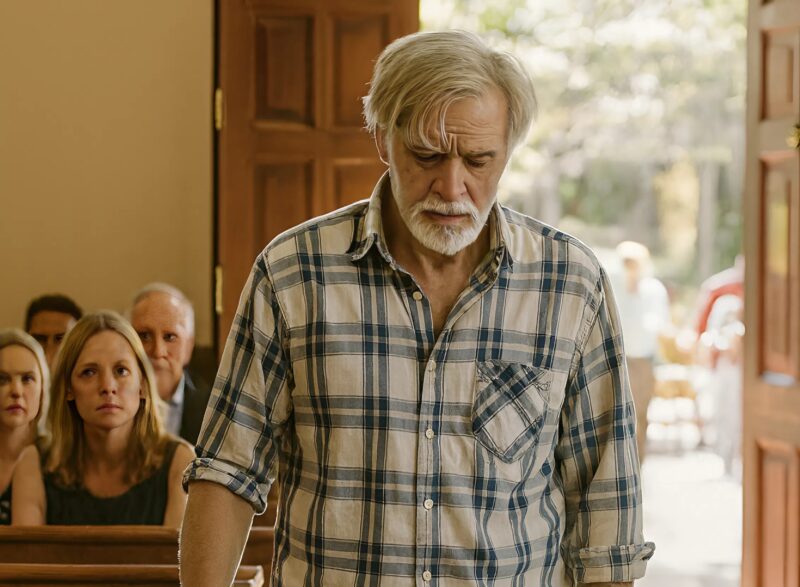A homeless man in dirty clothes and barefoot entered the church: the congregation looked at him with disgust, but what the priest did shocked everyone
It was quiet in the church. People sat on the benches; some prayed silently to themselves, others listened carefully to the priest’s words. Everything seemed as usual — until a man appeared in the doorway.
He was barefoot, in old torn clothes, with gray hair and a tired look. A faint whisper spread through the hall. Everyone noticed the heavy smell coming from him. A few women frowned, men turned away to get as far from him as possible. Nobody wanted to have anything to do with him.
The homeless man, understanding this, did not even glance toward the benches. He knew he was dirty, knew that “normal” people would not accept him. So he simply knelt down on the cold floor, folded his hands, and began to pray. His lips whispered words that almost no one could hear.
Meanwhile, the congregation kept whispering:
— What is he doing here?
— What a disgrace…
— He doesn’t belong here. Not even in church can we find peace from them.
Someone stood up and left, unwilling to sit next to such a “man.”
And at that moment, the priest interrupted the service. He slowly descended from the pulpit and walked toward the homeless man. The crowd froze. Everyone expected the priest to throw him out, but he did something unexpected
Continuation in the first comment
In a small, quiet church, nestled at the crossroads of a bustling city where the noise of everyday life often drowns out deeper thoughts, a gathering was underway. The congregation sat in their pews, expectant and calm, listening to the rustle of leaves outside and the gentle echoes of whispered prayers around them. The usual solemnity was interrupted when a man, appearing worn and world-weary, shuffled into the back of the church. His clothes were shabby, his face was tired, and his eyes—though gentle—carried shadows of hardship and many long nights.
As the priest noticed him, he felt an immediate pull at his heart, as if guided by an invisible hand. There was something about the man’s presence that quietly demanded acknowledgment. The priest, a figure of warmth and compassion, knew this was a moment calling for more than silent observation. He moved towards the man without hesitation, placing a firm, reassuring hand on the stranger’s back as if to say, “You are not alone.”
In a voice strong yet soothing, echoing in the rafters of the small church, the priest spoke with conviction that filled the sacred space.
“God sent you here, brother,” he said, his voice carrying the weight of warmth and welcome. “So that we may help you. So that through us, He may extend His hand to you.”
These powerful words resonated in the hearts of all who were present, reverberating with a truth that transcended the moment. It was as if the air itself held its breath, absorbing the gravity of the priest’s message.
In an act of humility and solidarity, the priest then took off his shoes and, stooping down, handed them to the man. This gesture transcended simple charity—it spoke volumes of respect, breaking down barriers between those who have and those who are in need.
“Take them,” the priest urged with compassion etched across his face. “Now pray with us.”
The invitation was not for prayer alone. It was a call to community, to a shared communion where dignity is restored and love conquers judgment. The priest’s voice carried on, a melody of sincere emotion.
“Today we will pray for your soul, for your suffering, for everything that forced you onto the streets. But we will also pray for the sins of those who judge a man by his clothes and look with hatred at God’s creation. For the Lord taught us to love our neighbor.”
Such words landed on the congregation with the force of a revelation, striking their hearts directly like a chisel carving truth into stone. Heads bowed almost instinctively, as if nodding in silent agreement with the reality they had forgotten. Many in the church found themselves looking at the floor, unwilling to meet each other’s eyes, consumed by a sense of shame and a newfound realization.
In that sacred moment, the veil of social divisions slipped away. Parishioners confronted their own biases and preconceived notions—those hidden judgments they cast quietly, perhaps unknowingly, every time someone different crossed their path. The priest’s message was clear and resonated deeply within their souls. It called upon a wellspring of compassion that starts in the quiet chambers of the heart—a reminder that goodness, true goodness, begins within ourselves.
As the service continued, a quiet transformation took place, where hearts softened and resolve to be better took root. And while the man left with new shoes on his feet, walking into the unknown with dignity restored, his presence left something behind—a lesson engraved in the minds of all who witnessed this act of kindness.
The story of the priest and the unnamed man serves as a timeless reminder that to judge is easy, but to love is divine. Often, the journey towards goodness is found not in grand gestures or public deeds, but in the quiet decision each person makes to show kindness and humility every day. And it is in these small acts of humanity that we truly reflect the divine within ourselves, paving the way for a world overflowing with grace, compassion, and understanding.







